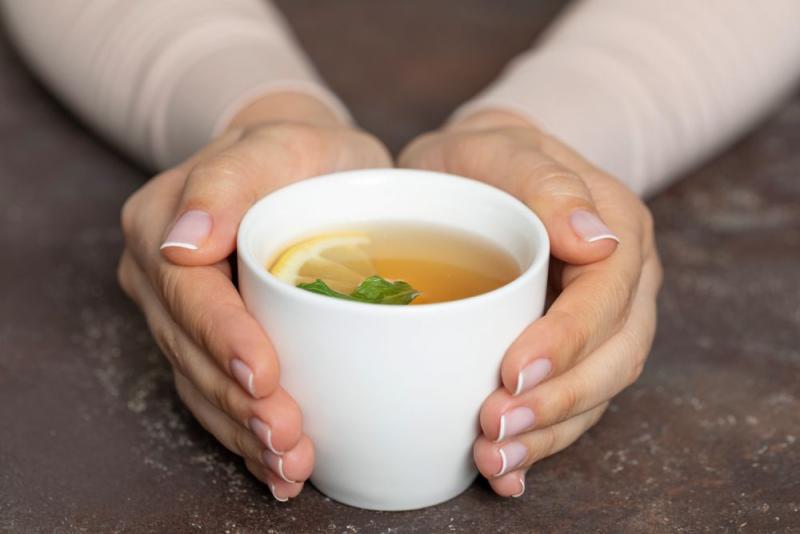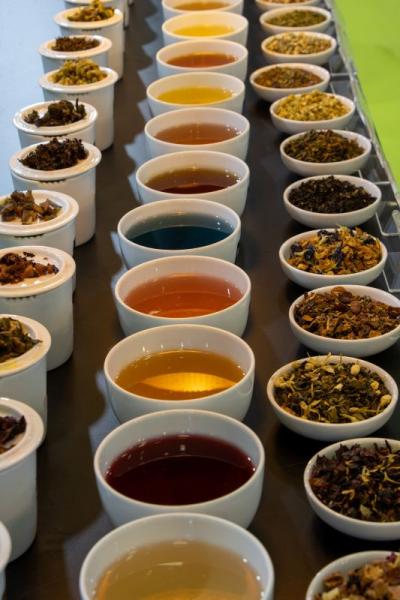
In certain circles, posing this simple question is likely to start an altercation very unbecoming of the spiritual drink known as tea. It’s a question that consumes avid specialty tea drinkers and tea business members alike, and one with more implications than I feel we’ve given credit.
As we all well know, herbal teas are in fact not tea at all, they are “tisanes.” But of course, tisane is an unfortunately obtuse jargon word that is not a part of everyday speech, no matter how much we all wish it was. Some of us go to painstaking effort to inform the public of this fact, doing all kinds of mental backflips and handstands just to get them to understand.
And we know this to be right. Tisane is the correct vernacular for an herbal tea. True tea can only come from the tea plant, Camellia Sinensis. If it does not come from Camellia Sinensis, then it is not tea. This is one of the first things we teach in the Certified Tea Master course, if for no other reason than to get the topic out of the way before it leads to inevitable confusion. However, an important question has been left out of this equation:
Does our current use of language really serve us?
I am going to argue that it does not, and I would like you, too, to really consider this. Especially if you are a staunch user of the word "tisane," it’s important to consider the implications of our use of language. And I would argue here that excluding tisanes from the title of “tea”—at least outside of specialty circles and the business—does our industry more harm than good.
Reason 1: Herbals are a stepping stone into tea.
There are a lot of potential customers in the West who don’t particularly care for tea, much less specialty offerings. It’s hard to really blame them—tea was something their grandmother might have given them when they were a child, using mass produced supermarket tea bags, usually full of tea dust. Imagine you are this person. You are a child, your tastebuds have not fully matured, and you are drinking something quite bitter and tannic; the only way to make it truly palatable for yourself is by adding a lot of milk and sugar. You’re not really sure why your grandmother seems to like it so much, but she does, and so when you’re at her house, you (reluctantly) drink tea.
And so, you grow up and go about your life not thinking about tea very much, because you’re pretty sure you don’t really like it. Then, someone gives you an herbal fruit tea (tisane). You think “Wow, this is tasty! It’s sweet and refreshing, and I didn’t know tea could taste like this!” And down the rabbit hole you go.
You begin to try other herbal “teas.” Many flavors come about. And eventually, at the specialty tea shop you’ve been frequenting to get your many herbals, the owner asks if you’d like to try a traditional specialty black tea.
At first, you’re a bit resistant. You remember that tea bag tea from your grandmother’s house, how bitter and tannic it was, and think you won’t really like it. That was “black tea,” too. But then you remember all of those herbal teas you’ve tried from this shop and how fantastic they were. If they were tea too, then maybe this traditional black tea could also taste good? At the owner’s insistence, you decide to give tea another shot.
Oh no.
You’re hooked.
You didn’t know traditional tea could taste this good. The energizing effect from the caffeine is more gentle and sustaining than it is from coffee. You need to go back to the tea shop. You need to buy more tea. You’ve stopped drinking coffee, and now tea fuels your day. You need to try more traditional teas. You remember that there were a lot of different varieties from a lot of different countries, and the owner swears many of them taste very different from one another. You can go on a trip around the world just by tasting tea.
He’s right. You are now sitting upon a mountain full of tea threatening to burst out of your cupboard. The shelves bulge with heat sealed packets of Indian Darjeeling and Chinese Mao Feng. You are another convert in the world of specialty tea. And if it weren’t for herbal “tea,” you might never have gotten here.
You wonder how you will possibly drink all of this tea. The tea shop owner is smiling and is happy with the sales.

Reason 2: It’s part of the common vernacular.
Be honest, when was the last time you called an herbal a “tisane” in front of your non-tea snob friends and then didn’t have to describe what a tisane even is? Whether we like it or not, “tisane” just isn’t a common word for herbals. It frequently fails to be understood by people outside of the industry (ergo, it’s jargon), who are unfortunately exactly the same people we are trying to turn into customers.
But it actually gets worse than this. When you try to explain that an herbal is not a tea because it is not derived from the tea plant, some people will even tell you that they didn’t know tea only comes from one particular plant. If you’re quite heavily steeped in the tea industry and most of your circles are into tea, this might be somewhat hard to believe, but the fact remains that a lot of the common populace hasn’t the faintest clue what a tea plant is supposed to be.
How we got here I think is fairly obvious—years of marketing campaigns selling common preparations like chamomile or peppermint as “tea” has firmly ingrained the idea that tea can come from different flowers and plants. We look at boxes of traditional tea and see those characteristic tea leaves, and then we look at peppermint “tea” boxes and see peppermint leaves, and then we look at chamomile “tea” boxes and see pictures of chamomile flowers. As the market broadened into other herbals, this acceptance of what “tea” pertains to has also gotten broader, until we have arrived at the point where just about anything you can steep in water can also be called "tea."
Disagreeing with a decades-long tsunami of marketing is always going to be an uphill battle. That herbals are “tea” is already ingrained in most customer’s heads. In essence, the ship has already sailed, and us dear proponents of "tisane" missed it.
Reason 3: People don’t like being told they’re wrong.
Let’s face it—plenty of us like telling other people they’re wrong, and plenty of us also don’t like being told we’re wrong. Picture that you’re a customer who really doesn’t like being talked down to. You come into the shop and ask for an herbal tea. The shop owner then delivers a lecture that you didn’t sign up for, however kindly, that herbal teas are not tea at all and are in fact tisanes. You feel a bit out of joint, and like the shop owner was maybe a little rude, and decide to buy one somewhere else.
Some people even double down when they’re told they’re wrong. Psychologists have identified the “backfire effect,” where the presentation of evidence to the contrary of a person’s beliefs causes them to double down even more firmly on the previously held belief. This is not something you want to happen in your tea shop.
In essence, it’s one thing to ask what the difference between a tea and a tisane is, and quite another to be harassed with the information whether or not you asked for it—especially when you are using the common vernacular anyway.
Reason 4: Teas and herbals share so many similarities that calling them both “tea” makes sense.
This is my final point. The reality is, you steep tea in hot water just the same as you steep herbals in hot water. Crucially, even true tea is just as much an herb as any other. It’s these similarities that caused large tea companies to label their peppermint and chamomile brews as teas just as much as their black and green tea offerings. This makes all their products more homogenous with their brand and delivers upon certain “expectations” within consumers’ minds.
When you buy a tea, you know exactly what to expect in terms of how to drink it. When you buy a tisane, if you don’t know what a tisane is, you might end up reading the back of the box just to make sure you’re preparing it the right way. This is in spite of the fact that teas and tisanes are brewed exactly the same way, the only variations being water temperature and time.
Simplification isn’t always the go-to, but in order to get more people into drinking teas and tisanes, it may be necessary.

But it’s not correct!
Yes, I hear you. I know. Technically, tisanes are not teas, and this will remain the case now in any technical understanding of the field. But language evolves, especially the common vernacular, over time.
In the field of linguistics, there are two competing philosophies: There are prescriptivists, who attempt to dictate the correct way to use language and preserve this for as long as possible. It’s often a losing battle because language will continue to evolve whether anyone wants it to or not. And then there are descriptivists, who simply describe how language is evolving and where it is right now.
Likewise, we can be tisane prescriptivists. We can try to fight the losing battle to kick herbals out of the tea category and potentially hurt ourselves in the process. Or, we can be descriptivists, and accept that language changes. We can roll with the way language is used and meet people where they’re at.
Which do you prefer?
Learn more about herbals and tea at World Tea Academy.
Plan to Attend or Participate in World Tea Expo, March 23-25, 2026
To learn about other key developments, trends, issues, hot topics and products within the global tea community, plan to attend World Tea Expo, March 23-25, 2026 in Las Vegas, co-located with Bar & Restaurant Expo. Visit WorldTeaExpo.com.
To book your sponsorship or exhibit space at World Tea Expo, or to inquire about advertising and sponsorship opportunities at World Tea News, contact:
Ellainy Karaboitis-Christopoulos, Business Development Manager, Questex
Phone: +1-212-895-8493; Email: [email protected]
Looking for professional tea education, certifications, and more? Visit World Tea Academy and register for courses today!
Also, be sure to stay connected with World Tea Expo on social media for details and insights about the event. Follow us on X, Facebook, Instagram and LinkedIn.
